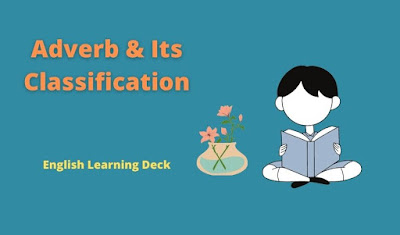An adverb is a word used to modify or qualify any Part of Speech except a noun or a pronoun. - J. C. Nesfield.
Adverb এর কাজ হচ্ছে কোন Verb, Adjective বা Adverb-কে করা বা এদের সম্পর্কে অতিরিক্ত তথ্য দেওয়া বা প্রদত্ত তথ্যকে তাৎপর্যপূর্ণ করে তোলা।
Example: - The leopard runs quickly. (Here quickly modifies
the verb)
- He works extremely hard. (Here extremely
modifies the adverb)
- Most of our countrymen are very poor. (Here very
modifies the adjective)
An Adverb answers these questions:
How? In what manner: patiently, slowly, softly, boldly.
When: recently, later, finally, daily, again.
Where: outside, here, there, down, away.
How often? Frequency: always, never, often, sometimes.
To what extent? To what degree: extremely, very, too, rarely, completely.
Why? Purpose: to avoid, to get.
Adverbs are divided into three
main categories:
i.
Simple
Adverb
ii.
Relative
Adverb
iii.
Interrogative
Adverb
Form of Adverbs: Many adverbs that express how an action is performed,
end in ‘ly’. However, there are many exceptions, like fast, well, never, least,
more, far, now, very, just, still, etc.
Simple Adverb: Adverb adds information and impression about time, manner,
place etc. in a sentence.
Kinds of Simple Adverbs: There are 6 kinds of Simple
adverbs according to
their functions in a sentence.
1. Adverb of Manner
2. Adverb of Place
3. Adverb of Time
4. Adverb of Degree or Quantity
5. Adverb of frequency
6. Adverb of Affirmation and negation.
1. Adverb of Manner:
Expresses the manner of an action, and answer the question ‘How? In what
manner?”
How? ---- I can hear it clearly. He reads loudly.
In what manner? ------- The person was badly treated.
কাজটি কিভাবে সম্পন্ন হয় তা বুঝায়।এধরণের Adverb গুলো হল
- happily, slowly, quickly, carefully, loudly,
easily, fast, bravely, hard, well, badly, clearly, closely, correctly,
soundly, swiftly, simply, suddenly, carelessly, possibly, probably, luckily, fortunately, unfortunately, naturally, rightly,
urgently, wrongly, widely thus etc.
Example: - Rafat is speaking quietly.
- He is doing the job carefully.
- The boy is crying loudly.
2. Adverb of Place:
Indicates the place of action, and answer the question “Where? and
Wherefrom?”
Where? ---- Stand here. Go there. Come in. Is Mr Das within? The horse galloped away.
Wherefrom? ---- This news has been collected locally.
কাজটি কোথায় হচ্ছে বা কোথা থেকে হচ্ছে বুঝাতে ব্যবহার করা হয়। এধরণের Adverb-গুলি হল – Here, there,
hither, thither, hence, thence, far, near, nearby, away, abroad, ahead.
overhead, inland, locally, universally etc.
Example: - Go out.
- I love to be here.
- People still live there.
3.
Adverb of Time: Indicates the time of an action, and answer the question
‘when’?
When? -----The train arrived late. He came here yesterday.
কোন কাজ কখন সম্পন্ন হয় তা বুঝাতে Adverb of Time ব্যবহার করা হয়। এধরণের Adverb-গুলি হল-
Now, then, before, since, ago, already, soon, late, afterwards, yesterday,
today, tomorrow etc.
Example: - I will do it now.
- The result will be published tomorrow.
4. Adverb of Degree or
Quantity: Expresses quantity, and answer the question ‘How much/ How far/ to
what extent’?
পরিমাণ বুঝাতে ব্যবহার করা হয়। এধরণের Adverb–গুলো হলঃ extremely, fully, quite,
almost, very much, too, a lot, totally, absolutely, fairly, hardly, partly,
wholly, completely, strongly, entirely, deeply, greatly, poorly, half, enough,
somewhat, altogether, little, a little, rather etc.
How much --- She is totally mad.
How far --- They are almost there.
To what extent --- I am rather busy.
Example: - He is quite wrong.
- She is fully cured.
- He is bad enough to kill you.
5. Adverb of frequency:
Expresses how often have the work done.
কোন কাজ কতবার করা হয়েছে বুঝায়। এধরণের Adverb–গুলো হলঃ Often, twice, sometimes, daily, seldom, usually,
frequently, ever, always, generally, rarely, monthly, yearly etc.
Example: - He goes to school daily.
They always come on time.
The employees are paid monthly.
6. Adverb of Affirmation and
negation: Indicate assertion and express the one’s reaction to question.
এরা কিছু হওয়া বা না হওয়া বুঝায়। এধরণের Adverb–গুলো হলঃ yes, no, yeah, never.
Example: - Yes, I can.
- No, she isn’t.
Relative Adverb: Relative adverb is used to join two clauses together.
এ সব Adverb স্থান, কাল, প্রকৃতি প্রভৃতি-এর সাথে Verb–এর সম্পর্ক নির্ধারণ করে। এধরণের Adverb–গুলো হলঃ Where, when, why, how.
Example -Show me the house where he was born.
-I do not know why he left the group.
-We do not know how it is done.
Interrogative Adverb: When adverbs are used in asking questions, they are
called interrogative adverbs.
এরা প্রশ্ন করতে ব্যবহৃত হয়। এধরণের Adverb–গুলো হলঃ Where, when, why, how.
Example: -Where are your parents?
-When did they come?
-How many boys are there?
-Why are you late?



0 মন্তব্যসমূহ